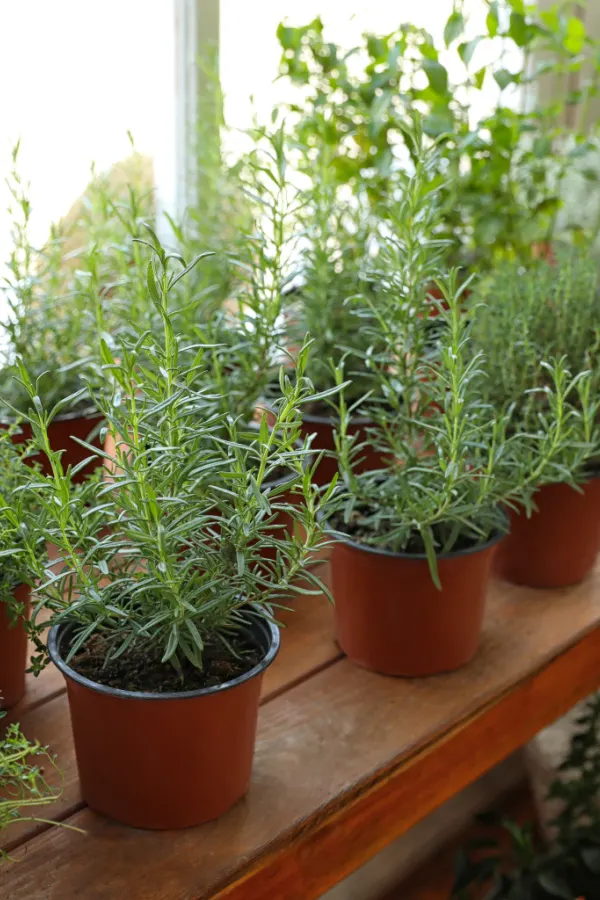Rosemary is an aromatic herb commonly used in savory dishes, but did you know there are many benefits of growing rosemary that go beyond the kitchen?
Most people associate rosemary with cooking dishes such as roasted meats, pasta sauces, pizzas, and other sauces and vinaigrettes. You can also enjoy the flavor and aroma of rosemary in simple teas.
Rosemary is grown as a perennial evergreen shrub that can grow as tall as 6 feet in height and around 4 feet wide. It can be planted directly in the ground or grown in containers for easy moving when cooler months arrive.

It features multiple small, thin, needle-like leaves that are grayish-green in color. Rosemary plants put out groups of tiny white, blue, purple, or even pink flowers in the late spring and early summer months.
You might be surprised to find out that the benefits of growing rosemary go beyond those of just culinary uses though. Keep reading to find all of the wonderful benefits as well as two simple and all-natural rosemary recipes to try out!
Basic Stats
Rosemary is hardy in USDA growing zones 8-11. For colder climates, people often grow rosemary in pots and containers and then bring the plants indoors during the winter months.
If temperatures in your location drop below 30º Fahrenheit (-1º Celsius), rosemary won’t be able to survive. Thankfully, you can still have a thriving rosemary plant when you move indoors during the cold spells and back outside when temperatures allow.
Rosemary plants require full sun while growing outdoors. When you grow them indoors, you will need to add grow lights or be sure to keep them in a South-facing window. While it is drought tolerant, it grows best in sandy, well-draining soils.
You can grow rosemary either from seeds or from cuttings of mature plants (Seed Product Link). Once it is mature, harvest often to help keep plants at a manageable size but never take more than a third of the plant.

It takes about two years for rosemary to become mature. After this time, it is capable of producing blooms under the right growing conditions. With proper care, your rosemary plant can survive for many years.
The Benefits Of Growing Rosemary
There have been many different studies that have been done on the benefits of growing and using rosemary. While many confirm the following benefits, more studies still need to be performed.
As with any health-related advice, please do additional research and be sure to talk to your doctor if you have specific concerns or questions before adding rosemary to your diet or using it topically.
Help Lowering Blood Sugar
There are many people who suffer from high blood sugar. If you don’t stay on top of it, high blood pressure can cause issues with your heart, kidneys, nervous system, and even your eyesight.
Some studies have shown that consuming rosemary might help to manage high blood sugar for people with diabetes. In animal testing, some of the compounds in rosemary have an effect on blood sugar that is similar to that of insulin.
Antioxidant and Anti-Inflammatory
Many different foods that derive from plants are often high in antioxidants and anti-inflammatory compounds. The compounds in rosemary are capable of helping to improve blood circulation as well as boost immune systems.

Adding a few leaves to your dishes can be a great way to get these extra antioxidants into your diet. It’s especially important to consider using it during the winter months when your immunity might need a little boost.
Improve Memory and Mood
It is said that the aromatic nature of rosemary might be able to help improve a person’s mood as well as help to improve their memory. There have been several British studies that tie scents like rosemary to better concentration and memory.
Having a cup of rosemary tea while studying might be just what you need to help boost your attention and alertness the next time you are cramming for a big test. Or add a few drops of rosemary essential oil to your diffuser to help relieve stress if you tend to suffer from anxiety.
Help Brain Health
Rosemary might also be beneficial for your brain. Some studies done on animals claim that rosemary might help someone recover from neurological issues after suffering from a stroke.
Some studies even indicate that consuming rosemary can help prevent or slow down the effects of Alzheimer’s. More studies are likely needed in order to verify the true effects on humans.
Reduce Aches and Pains
One of the benefits of growing rosemary is that you can use it as a chronic pain reliever. Due to its anti-inflammatory properties, you can turn fresh rosemary into a massage oil for backaches, sore muscles, sore arthritic joints, etc. You can find a simple recipe for rosemary topical oil at the end of this article.

The aroma as well as the oil produced from rosemary can also help to relieve headaches. Take a warm bath with the essential oils and warm water, sip a cup of warm rosemary tea, or rub the oil directly on your temples for natural headache relief.
Additional Benefits
Fresh rosemary can help alleviate some digestion problems such as indigestion and heartburn. It helps to create a healthy gut environment by balancing bacteria and reducing the inflammation that might be present. A cup of rosemary tea might help reduce cramps, constipation, or bloating.
If you suffer from asthma or allergies, breathing in the steam from boiling water and a few rosemary leaves might help to reduce inflammation in your airways. Relaxing in a warm bath with fresh rosemary or a few drops of essential oil may also help.
Some studies even state that rosemary, in addition to other treatments, can possibly help slow down age-related eye issues and diseases. Again, more studies are likely needed.
There are even some studies that say that rosemary can possibly help to slow down or prevent baldness and even promote hair growth. This is because the oil in rosemary helps to increase blood circulation. Some even claim that it can be used to help with dandruff or dryness of the scalp.
Two Easy & Natural Rosemary Recipes
While some of the benefits of growing and using rosemary may need different forms of the plant. Some may need to be consumed or taken orally, but many of them can be achieved by drinking a simple rosemary tea or using topical-infused rosemary oil. Use the following recipes to create your own natural rosemary remedies.

Rosemary Tea
You only need two simple ingredients in order to make this simple rosemary tea: water and rosemary
Start by bringing 1 cup of water to a boil. Add in 1-2 teaspoons of fresh rosemary leaves (.5 Tablespoons dried rosemary). You can either add them loose or use an infuser. Seep for 5 to 6 minutes. Strain the rosemary leaves and either discard or compost them. Add to your favorite cup and add your choice of sweeteners such as honey or sugar.
Infused Rosemary Oil
You can use this infused rosemary oil as a topical treatment for many of the above issues. Again, it only takes a few simple ingredients to make.
Add several sprigs of freshly picked rosemary to fill a clean mason jar. Add enough olive oil to cover the sprigs. Cover the jar and leave it in a sunny location for about a month. Strain out the rosemary and add the oil to a new clear jar or container. Store in a cool, dry place. If kept tightly closed and out of direct light, the oil can last up to six months.
Follow Our Facebook Page For Even More Great Tips! Simple Garden Life Facebook Page
Simple Garden Life is a website dedicated to keeping gardening fun, simple and enjoyable! We publish two new articles each week along with a new garden podcast episode every two weeks. This article may contain affiliate links.
